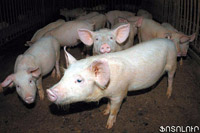The conversations about the African plague that penetrated in Armenia is gradually pushed backward. However, according to Grisha Baghyan, head of the State Food Safety and Veterinary Inspection at the Ministry of Agriculture, the cases of this disease have neither reduced not increased.
Let’s remember that the disease, which mainly affects pigs, was first detected in a village near the Georgian border on August 7 before spreading to six other rural communities in the Lori and Tavoush regions. Armenian veterinary authorities say it was the cause of mass deaths of pigs reported by local farmers. Armenia has officially accepted the African plague in our country after the conclusion of the Russian experts. No other country experts have examined the pigs in Armenia despite the fact that the Armenians have sent samples of pork to Great Britain for examination. It turns out that the sample that was to be sent to Great Britain didn’t cross the border of Armenia. Zvartnots airport doesn’t have any experience to transfer such packages and doesn’t’ have necessary equipment for you. “We are going to transfer the sample to the UK through some other way,” says Grisha Baghyan. Due to this disease Russia, Georgia and Ukraine prohibited the exportation of organic food from Armenia. Pork exportation from Armenia is totally prohibited and no one knows how the pork sample is going to be sent out to England. Baghyan mentioned that they are still negotiating with the British Embassy to send the sample through their connections. It turns out that the problem is connected not with the Zvartnots airport but England. In this regard the US is being strangely silent. To this question Baghyan answered that it’s the individual decision of each country to make announcements. The chief veterinarian of Armenia is also very surprised by the silence of the US. In particular, it’s strange that the US doesn’t ban the exportation of the Armenian cheese to the US. This country has given certain quotas to the companies, which import Armenian cheese. It’s been two months since the local producers have stopped cheese exportation because Armenia has officially banned exportation of organic food from Armenia as long as Armenia is in quarantine. Three local companies in support of the US Agriculture Department CARD center are exporting goat and cow cheese to the US. Gomk factory of Vayots Dzor has been exporting cheese to the US for three years. Unlike the external market goat cheese doesn’t have much demand in Armenia. The US government has provided unlimited quotas for goat cheese importers. The director of Gomp, Pandukht Manukyan says that in past years they were able to export 10 tons of goat cheese. This year they may export 12 tons, which will be realized after the completion of the quarantine in the country. “Dustr Melanya” company of Tashir exports cow cheese both to Russia and USA. This company has also ceased exportation and consumes the cheese in the internal market. “Accessing the local market is not that easy,” says the company director Ruben Harutyunyan. “Dustr Melanya” company has been busy with cheese exportation for the past 7 years. It annually exports 60 tons to the US and 80 to Russia. “We export the cheese in closed containers. Therefore there cannot be any danger. I get surprised why the government bans exportation,” wonders Harutyunyan. There are over 2 dozens of cheese exporters in Armenia, which mainly provide workplaces for rural communities. As of financial damages the management of the company doesn’t rush with assumptions but they think if the quarantine prolongs for too long they might lose markets. “How long is this quarantine going to take,” everybody was asking this question. According to official information the quarantine can be ceased only 40 days after the last found diseased pig. According to state sources the disease has also reached Dilijan and Barekamavan villages. In Dilijan there was no case pig death. Dilijan residents have their own interpretation about the plague, according to which the plague has started from pig breeding farm, the owner of which is NA deputy, Hakob Hakobyan (Hakob of Arpa Sevan). Local experts think that the cause of the death of the pigs in Dilijan was because of the wrong nutrition or perhaps incorrect breeding. “The meat of the pork, which is diseased immediately gets yellow but nothing like that happens in our villages,” says one of the local experts. Grisha Baghyan has also confirmed the words of his colleague. “The meat doesn’t’ change its color during African plague. The infection is not dangerous for human beings. Instead it rapidly spreads among other pigs and boars.” He states that there is no vaccine against this disease. The only way of fight is quarantine. The quarantine includes strict control on the borders; washing vehicle tires, etc.

